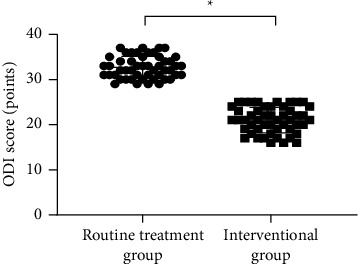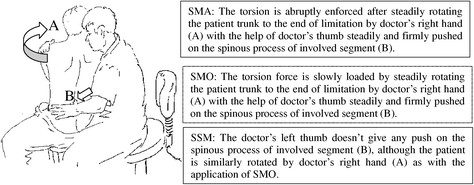This study explored the curative effects of remote home management combined with ‘Feng’s spinal manipulation’ on the treatment of elderly patients with lumbar disc herniation (LDH). (LDH is understood by the investigators to be a condition where lumbar disc degeneration or trauma causes the nucleus pulposus and annulus fibrosus to protrude towards the spinal canal and to constrict the spinal cord or nerve root.)
The clinical data of 100 patients with LDH were retrospectively reviewed. The 100 patients were equally divided into a routine treatment group and an interventional group according to the order of admission. The routine treatment group received conventional rehabilitation training, and the interventional group received remote home management combined with Feng’s spinal manipulation. The Oswestry disability index (ODI) and straight leg raising test were adopted for the assessment of the degrees of dysfunction and straight leg raising angles of the two groups after intervention. The curative effects of the two rehabilitation programs were evaluated.
Compared TO the routine treatment group, the interventional group had a remarkably higher excellent and good rate (P < 0.05), a significantly lower average ODI score after intervention (P < 0.001), notably higher straight leg raising angle, surface AEMG (average electromyogram) during stretching and tenderness threshold after intervention (P < 0.001), markedly lower muscular tension, surface AEMG during buckling, and flexion-extension relaxation ratio (FRR; (P < 0.001)), and much higher quality of life scores after intervention (P < 0.001).
The authors concluded that remote home management combined with Feng’s spinal manipulation, as a reliable method to improve the quality of life and the back muscular strength of the elderly patients with LDH, can substantially increase the straight leg raising angle and reduce the degree of dysfunction. Further study is conducive to establishing a better solution for the patients with LDH.
The authors state that “Feng’s spinal manipulation adopts spinal fixed-point rotation reduction to correct the vertebral displacement, and its curative effects have been confirmed in the treatment of sequestered LDH.” This is an odd statement: firstly, there is no vertebral displacement in LDH; secondly, if the treatment had been confirmed to be curative, why conduct this study?
Moreover, I don’t quite understand how the authors conducted a retrospective chart review and equally divide the 100 patients into two groups treated differently. What I do understand, however, is this:
- a retrospective review does not lend itself to conclusions about the effectiveness of any therapy;
- no type of spinal manipulation can hope to cure a lumbar disc degeneration or trauma that causes a herniation of the nucleus pulposus and annulus fibrosus.
Thus, I recommend we take this study with a sizable pinch of salt.



VERY strange publication… they describe scoliosis as part of LDH clinical presentation…they present positive SLR at 60+ YOA patients… things that do not exist in common practice.
As to the SMT itself… we know from nunerous biomechanical models that L4L5 & L5S1 discs increase intradiscal pressure by 2.5 fold when sitted… what sense is there in a sitted manipulation for an already injured disc?
it’s not often that we agree!
Even a blind rooster finds a grain once a day 🙂
I would not refer to you in such terms
I can ‘recommend’ chiro treatment, as someone who had a herniated disc in 1984. My chiro used the same thumpy, thumpy nonsense & caused serious damage which forced me, by an inability to walk, to see a neurosurgeon who operated on12 December 1984.
Not only 37 pain free years, but capacity to build a house and play sport.
An odd irony, chiro incompetence, inadvertently, gave me me a new life free of pain. No wonder I hate chiro
Frank
May I inquire what was the specific type of surgery ?
So story time? My daughter two years ago had a spinal fusion. After the surgery she lost all motor control of her right leg. She hasn’t been able to walk since. So I guess, by your reasoning, I should hate orthopedic surgery.
But I don’t as I realize some adverse events are preventable and some are not. If preventable, I would hold the doctor/nurse/chiropractor or whomever responsible, not the whole profession.